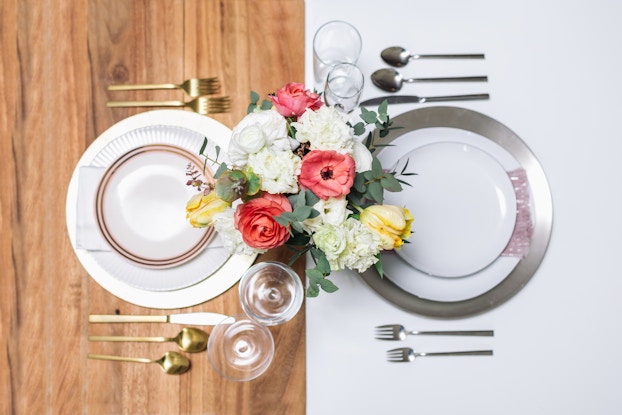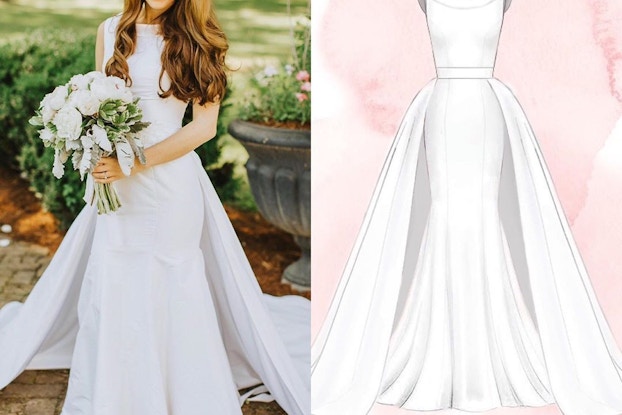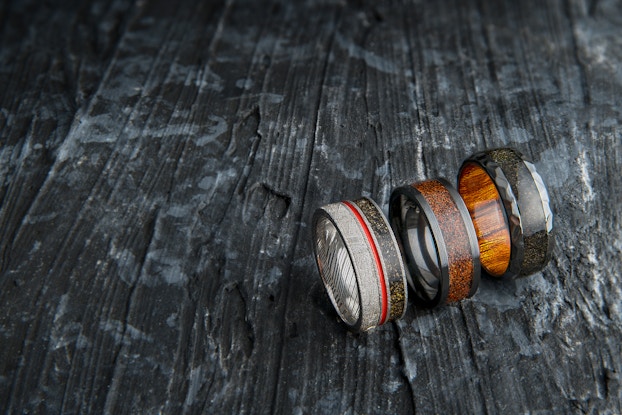
Leslie Voorhees Means, Danit Zamir and Johnathan Ruggiero are millennial entrepreneurs who each had lightbulb moments while planning their own weddings. They became frustrated with elements of a notably traditional industry — from the cookie-cutter gowns and wedding bands to the pricey floral arrangements that get trashed the next day — and decided to create new solutions.
Two of them saw their sales increase as the coronavirus pandemic closed brick-and-mortar stores, while the third found her business on pause as wedding receptions were postponed. All three believe the vast U.S. wedding market gives them lots of room to grow.
Research firm IBISWorld reported that the wedding services market was expected to generate $75 billion in annual sales in 2019.
A survey by The Knot, the online wedding planner and registry, found that the average cost of a wedding was $33,900, excluding honeymoon expenses, in 2019.
The size of the wedding market, and the spending power of brides and grooms, has generated a boom in wedding-related startups over the past decade, but not all have succeeded. The pandemic has hit some harder than others.
Zola, a site that started as a wedding registry and has branched into selling invitations, wedding planning and honeymoon planning, had been hailed as one of the fastest growing wedding disruptors. In April the company confirmed that it was laying off 20% of its staff, cutting salaries and shifting to a four-day workweek.
But while the pandemic has postponed weddings, brides and grooms are still preparing to celebrate at a later time.
The Knot’s Wedding Wire division reported in May that most couples were postponing — not canceling — their weddings, and that more than 90% do not plan to reduce their guest lists or their budgets for their delayed events.
Voorhees Means, co-founder of custom wedding dress e-tailer, Anomalie; Danit Zamir, founder and CEO of flower-sharing marketplace Bloomerent; and Johnathan Ruggiero, co-founder of e-commerce wedding band company Manly Bands, spoke with CO— about the impact of the pandemic and why they see ongoing opportunities in the wedding space.
We definitely think we’re disrupting something that’s pretty antiquated.Leslie Voorhees Means, co-founder, Anomalie
Trends
Bloomerent has made a successful business by going green, and Anomalie runs its business completely virtually. Read on for some business ideas inspired by burgeoning trends that are easy to start.
Anomalie’s angle: Designing your dream dress online
Leslie Voorhees Means and her husband founded online wedding dress startup Anomalie after Leslie learned firsthand the frustrations involved in buying a wedding dress.
She put the supply chain and logistics knowledge she gained working in China for retail giants Nike and Apple to source her custom wedding dress from a Chinese factory.
So many friends began begging her to do the same for them, that Anomalie was born in 2016.
Means, and her husband, Calley, set out to create a company where all the interactions with brides, from designing the dress to getting measurements to customer service, are handled remotely, without stores.
That strategic decision, made long before anyone had heard the word coronavirus, has boosted Anomalie’s sales during a time when the pandemic closed bridal boutiques and retailers across the country.
“This is an industry that is very heavily brick and mortar, so when brick-and-mortar options are completely unavailable, we’ve been able to step in,” Means told CO—.
The company recorded its best sales month ever in March, and since then, sales are running three times greater on a week to week basis, compared to figures from last year.
Anomalie customers design their dream dress online by answering questions about their style preferences. They receive a sketch of their own design, and have a phone consultation with a stylist to finalize details.
The startup, which has received over $20 million in venture funding, has invested heavily in tech to improve its visualization tool, which helps brides “see” their design, and to improve the fit of each dress.
Anomalie, Means said, gives brides more size options, from 00 to 30, than they will find in a typical salon, more design options and a better price range, with the average Anomalie dress costing $1,600.
“We definitely think we’re disrupting something that’s pretty antiquated,” Means said.

Bloomerent: A flower-sharing service for brides
Danit Zamir, CEO and founder of Bloomerent, wasn’t fussy about her floral arrangements when she got married in 2014. She told the florist to keep it neutral, and to use the least expensive flowers.
“But even with that mindset, my flowers cost so much money and I couldn’t understand why,” Zamir told CO—. It also bothered her that those expensive flowers would be tossed in the trash the next day.
That led her to devise a solution that would save money for brides, and eliminate the environmental waste of single-use flowers.
Bloomerent, the online marketplace Zamir created, connects florists and brides and makes it possible for brides to get a discount — and have a greener wedding — by sharing arrangements.
Zamir has built a network of vetted florists in 28 states. Brides can use Bloomerent either as a “first-event” customer — the person who requests specific arrangements — or a “second-event” bride — someone who uses the platform to find arrangements that are available for reuse.
First-event brides get a 10% refund when their flowers are reused. Second-event brides get their flowers at a 40% to 60% discount.
Florists like Bloomerent, Zamir said, because most wedding venues require them to pick up the flowers after the wedding and dispose of them.
“Then they come back to their studio and kind of scratch their heads trying to figure out what to do with these flowers,” she said. “Everyone was trying to do whatever they could not to just throw them out.”
Florists pay Bloomerent a fee when it connects them to brides. Zamir declined to say what that is, but said it is a standard referral rate.
The coronavirus crisis has shut down new orders for wedding flowers. “It seems like this wedding year will essentially be skipped over because people are worried about rescheduling for the fall,” Zamir said.
Bloomerent runs a lean operation, with three employees, and therefore can survive the downturn better than larger startups. Right now, Zamir said, “it’s a waiting game to see what happens next and when.”

Manly Bands — non-traditional rings for men
Johnathan Ruggiero turned his disappointing experience buying a wedding ring into a thriving e-commerce business.
Manly Bands, which sells men’s wedding bands made from “rugged” materials like titanium, wood and dinosaur bone, as well as custom designs, has grown to more than $10 million in sales since its 2016 launch, and is preparing to add a women’s line.
The company’s sales have doubled year-over-year since 2016, and have seen a surge since the start of the pandemic. Ruggiero believes the recent sales increase not only is a result of closed jewelry stores, but reflects a growing demand for a better wedding band shopping experience for men.
When he was getting married in 2016, Ruggiero found that jewelry stores either didn’t have the ring size for his large hands (16) or styles he liked. He ended up buying a ring online, but wasn’t happy with the ring, or the customer service he received.
With so much of the wedding planning centered on making the brides wedding dreams come true, “I wished at the very least I could be excited about my ring,” Ruggiero told CO—.
He and his wife, Michelle Luchese, co-CEO of Manly Bands, started the company out of Michelle’s parents’ garage in Florida. The company now is located in Salt Lake City, Utah, and has 25 employees.
Ruggiero believes Manly’s untraditional designs resonate with today’s couples, who want their weddings and their wedding bands to reflect their personalities.
The company lets shoppers create custom designs, and Ruggiero has seen an uptick in those sales. “People really want something unique to them,” he said.
It recently launched a brand for women, called Rosie Ray.
“We’re going to take the formula that worked for Manly Bands — that we’re not your traditional jewelry store — and apply that to the women’s side,” Ruggiero said.
CO— aims to bring you inspiration from leading respected experts. However, before making any business decision, you should consult a professional who can advise you based on your individual situation.
Want to read more? Be sure to follow us on LinkedIn!
CO—is committed to helping you start, run and grow your small business. Learn more about the benefits of small business membership in the U.S. Chamber of Commerce, here.

What can membership do for your business?
Gain tools to stay informed, competitive, and connected by becoming a U.S. Chamber of Commerce member. Membership gives you direct access to expert policy insights, economic updates, and exclusive resources designed to help your business thrive. From behind-the-scenes analysis from D.C. to exclusive discounts and expert support, U.S. Chamber membership helps you navigate change and seize new opportunities.







